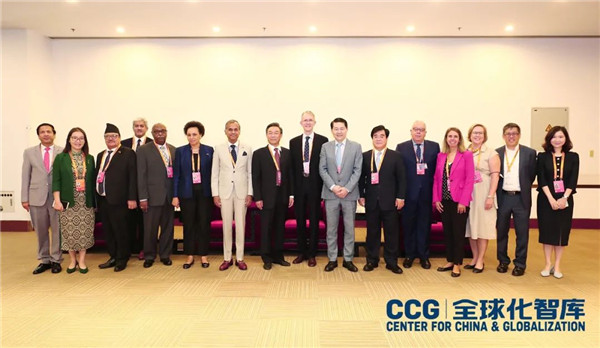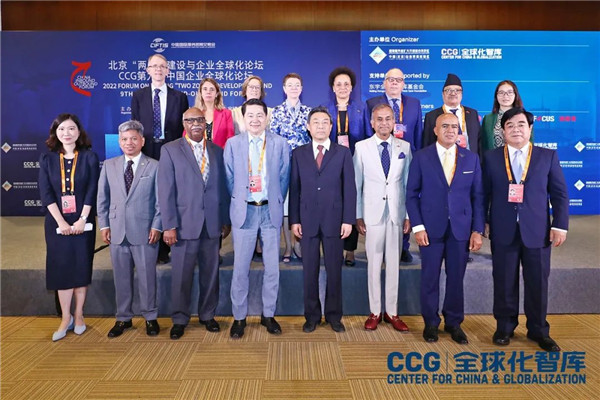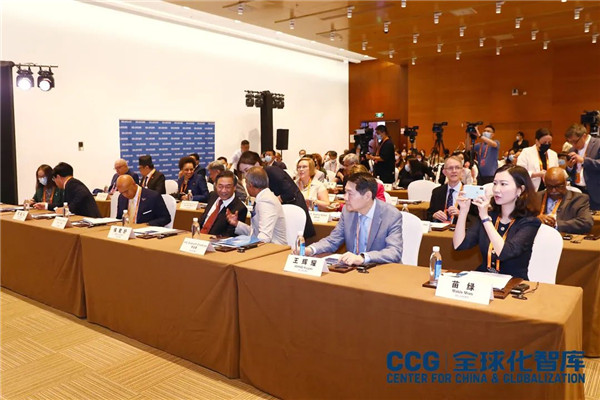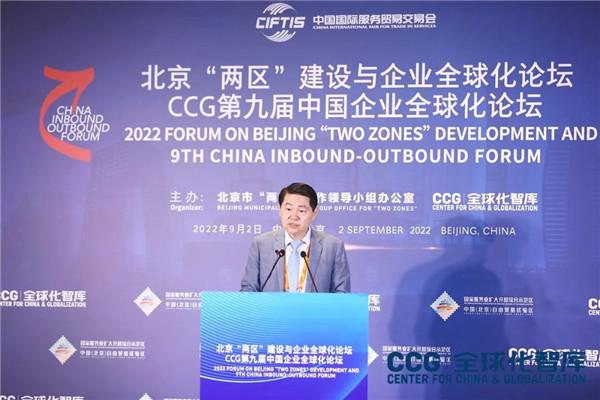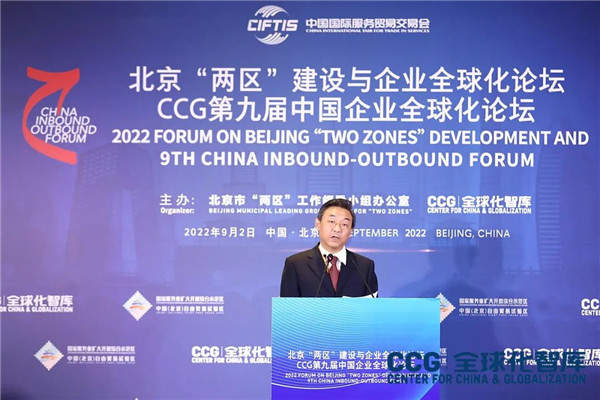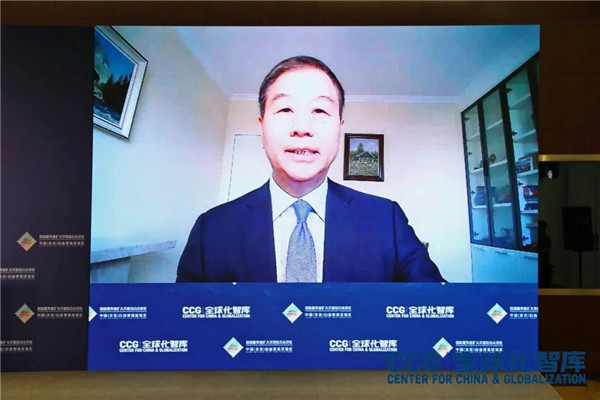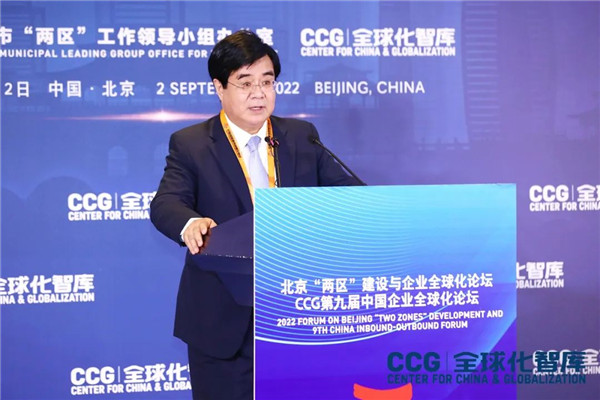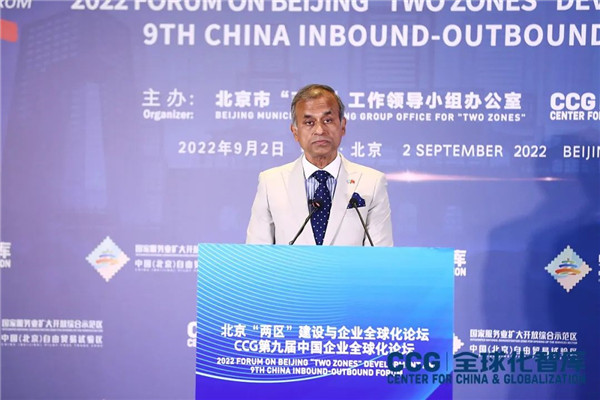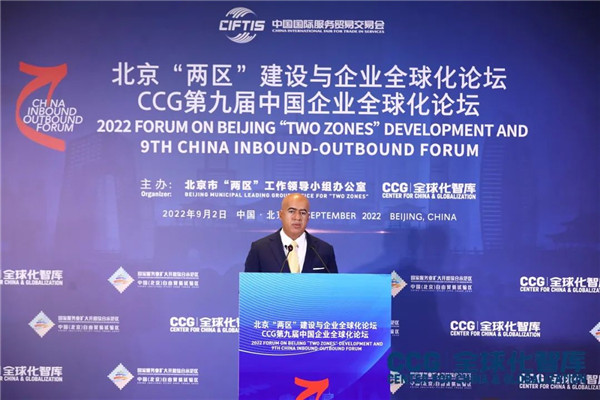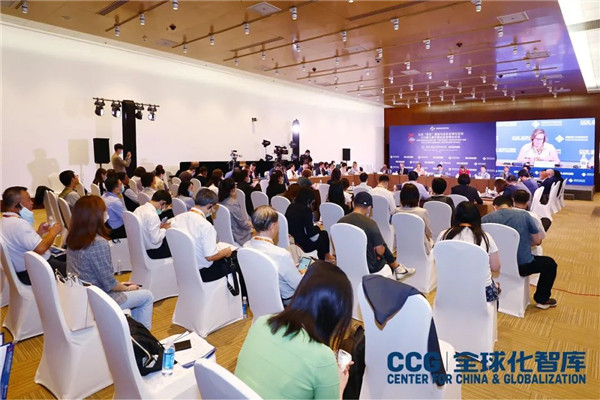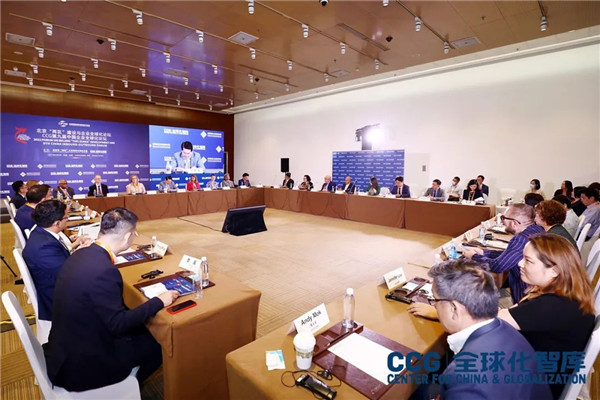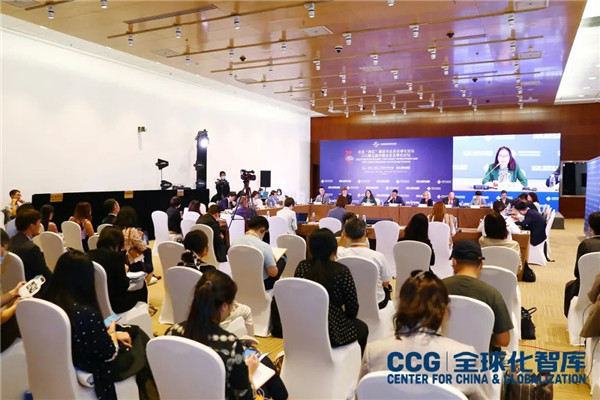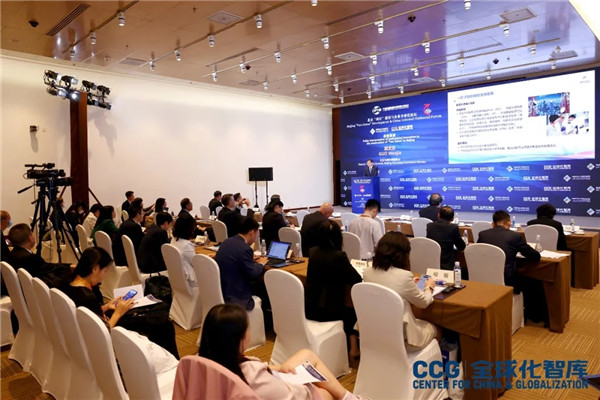9th China Inbound-Outbound Forum
The 9th China Inbound-Outbound Forum, which showcased the success of Beijing’s “Two Zones” and corporate globalization, was held on September 2, 2022 at the China National Convention Center in Beijing, China.
The event was co-organized by the Center for China and Globalization (CCG) and the Beijing Two Zones Office as part of the China International Fair for Trade in Services (CIFTIS), which was held from August 31 to September 5. The forum welcomed officials from the Beijing Municipal People’s Congress and the Two Zones Office, diplomatic envoys and senior officials in China, policy experts from various ministries, as well as representatives from top domestic and international players in the service trade sector.
Roundtable discussions and dialogues were held as part of the forum on topics ranging from “Reviving Services Sector in Post Pandemic Era: Governance and Cooperation”, “Advancing Multi-sectoral Stakeholder Partnerships for the 2030 Agenda: The Global-Local Nexus Explained”, and “Powering Innovation Strategy for Digital Economy: Best Practices and Lessons Learned”. The forum also included a special session for members of the Global Young Leaders Dialogue (GYLD), a CCG initiative focusing on youth and development begun in 2020.
In his opening address, CCG President Wang Huiyao said that 2022 has been an extremely extraordinary year. The continued impact of the pandemic, escalating geopolitical tensions and a global economy in decline means the the world needs to be open to voices of rational cooperation. CIFTIS is the world’s only national, international and comprehensive platform for trade in services and its continued impact since 2012 demonstrates China’s determination to continue opening up, strengthen global economic and trade cooperation, and drive the “going out” and “bringing in” of service trade enterprises. While protectionism is on the rise, openness and cooperation are still mainstream in the international community. China has worked continuously to achieve an even higher level of opening up and ensure positive, mutually beneficial cooperation and win-win development on the world stage. Tourism, studying abroad, financial services, academic exchanges, business and trade, and a host of other services rely heavily on economic, trade and cultural exchanges, which we hope can be restored as soon as possible.
HOU Junshu, Vice Chairman of the Standing Committee of Beijing Municipal People’s Congress said that CIFTIS is important for creating new momentum in service industries, promoting high-quality economic development, and driving international cooperation. As the event’s host city, Beijing takes a leading role in terms of creating a more open service industry and developing trade in services. In the first half of this year, Beijing’s service industry accounted for 84.6% of GDP, 30% higher than the national average, and its trade volume in services accounted for about 1/5 of the national total . Beijing has given full play to its role as a testing ground, constantly deepening reforms and innovation, strengthening its efforts to become more open, blazing new trails in constantly changing situations, and advancing to a higher level of development.
Yi Xiaozhun, former deputy director-general of the World Trade Organization (WTO) said that as of June this year, the latest service trade prosperity index released by the WTO had risen to 105.5, which is significantly higher than that of trade in goods, showing the resilience of the global service trade industry and a shift in people’s consumption patterns from products to services. Many countries have started to see signs of hope in their fight against the pandemic, but not long ago the World Bank issued a forecast that the world economy could possibly see the largest decline in the past 80 years. The inflation rates in Europe, the United States and emerging economies are over 8% across the board and as extreme climate events occur worldwide, it is estimated that the number of starving and malnourished people around the world will increase by 13 million in 2021. As we face multiple crises, global economic governance will continue to face multiple challenges such as a looming global recession, severe division within multilateral institutions, and the collapse of the rules-based global economic and trade order. To safeguard both domestic and global common interests, all countries, but major powers in particular, should abandon a zero-sum Cold War mentality and actively take on their due responsibilities, building bridges by strengthening multilateral cooperation through the G20 and the Bretton Woods system, to reconnect the world that has been deeply divided and fragmented.
ZHOU Yanli, CCG Advisor and Former Vice Chairman of China Insurance Regulatory Commission said that with the development of new information technology, there are unprecedented opportunities in the digital economy, which makes it necessary to establish internationally accepted rules in order to give full play to the value created by new products and new markets emerging within the digital economy by eliminating trade barriers, and promoting the interoperability of different digital systems. The Chinese government has made special arrangements to expand international cooperation in this sector and, in the future, China will work to further integrate the digital economy into a new model of global development and inject new momentum into a global digital economy.
Siddharth Chatterjee, UN Resident Coordinator in China, pointed out that all countries have been affected equally by changes in the digital sector, which will have a major impact on the implementation of the 2030 Agenda for Sustainable Development, bringing both great opportunities and serious challenges. The widening digital divide could threaten developing countries, especially LDCs, leaving them further behind. It is vital that we promote digital inclusion, work to bridge the digital divide, and ensure that digitalization creates global opportunities while mitigating potential negative consequences. Urgent action is needed to ensure that emerging technologies become global public goods with equal access for all regions and all segments of society. This must be done with the goal of building an effective global digital cooperation architecture, in areas such as artificial intelligence, to better support the achievement of the economic, social and environmental goals of the 2030 Agenda. As the world’s second largest economy, China is a world leader in many areas of digital technology and the United Nations Office in China is eager to play a bridge role and use China’s experience and advances in digital technology to benefit other developing countries. No country, institution or company has the ability to achieve the SDGs alone, and strengthening multilateralism is our only option. Through global partnerships with governments, businesses and individuals, we can act together to innovate and deliver on the 2030 Agenda and its core commitments, leaving no one behind.
Ali Obaid Al Dhaheri, Ambassador of the United Arab Emirates to China, ephasized the fact that over the past few years, the intensification of geopolitical conflicts and the impact of economic globalization require global policymakers to take greater steps to reverse trends in de-globalization and enhance cooperation and sharing among countries. The UAE and China have a comprehensive strategic partnership and hope to be committed to building a more prosperous and united world, partially through digital solutions. In terms of trade in goods and services, the UAE has outlined several goals – first among these is to increase trade with China, especially trade in services, to a higher level over the next 10 years. In terms of technological innovation, we have a great deal of mutual respect for the cooperation between the two countries in trade and technology, especially in the digital economy. The world is becoming more diverse, and we need to address looming and emerging challenges on a global basis. To achieve development requires inclusiveness and we need to work with China and other key players to achieve a consensus on how to solve current cross-border challenges and to promote and generate new development opportunities.
The China Inbound-Outbound Forum was first held in 2014 and has been held annually for eight consecutive years. The Forum is committed to creating a new model for discussing issues related to the global economy that is based in China’s current position in the world and a common ethos of “going global”. The Forum has been influential in helping Chinese companies “go out” while at the same time acting as a channel for foreign investment.
Honored guests and speakers at the forum included:
H.E. Raja Dato Nushirwan Zainal Abidin, Ambassador of Malaysia to China
Sir Danny Alexander, Vice President, Asian Infrastructure Investment Bank
CHAI Qimin, Director of Strategy and Planning at National Center for Climate Change Strategy and International Cooperation (NCSC)
Justine Coulson, UNFPA Representative to China
H.E. Ali Obaid Al Dhaheri, Ambassador of the United Arab Emirates to China (CIFTIS 2022 Country of Honor)
Joshua Dominick, Founder of Krankin’ thru China
DONG Ruiping, CCG Senior Council Member, Vice President of Corporate Affairs for Herbalife China
H.E. Rahamtalla M. Osman Elnor, Permanent Representative of African Union to China
H.E. Clare Fearnley, Ambassador of New Zealand to China
H.E. Graham Fletcher, Ambassador of Australia to China
H.E. Patricia Hildegard Flor, Ambassador of Germany to China
Noah Fraser, Managing Director for China of Canada China Business Council
H.E. Wim Geerts, Ambassador of Netherlands to China
H.E. Maria Gustava, Ambassador of Mozambique to China
H.E. Sophie Hottat, Chargé d’affaires a.i, Embassy of Belgium to China
Guillaume Joyet, Marketing & Events Manager of SwissCham
H.E. Soile Kauranen, Chargé d’affaires, Embassy of Finland to China
Joseph Keating, Trade, Commerce, Technology and Innovation Counsellor, Embassy of Ireland in China
Zoon Ahmed Khan, Research Fellow at the Belt and Road Institute in Tsinghua University
Lineo Kobeli, International Relations Specialist, Africa Guangdong Business Association
LIU Chang, Vice President of Knorr-Bremse AG China
LIU Meiying, Deputy Director, Office of the Leading Group of Beijing “Two Zones”, Beijing Commerce Bureau
Matthew Margulies, Senior Vice President of China Operations for the US-China Business Council
MENG Dongping, Vice President of China Chamber of Commerce for Import & Export of Medicines & Health Products (CCCMHPIE)
Mabel Miao, CCG Secretary-General
QIN Hu, Vice President of the Environmental Defense Fund (EDF), Interim Chief Representative of EDF’s Beijing Representative Office
QUAN Bin, CCG Senior Council Member, Vice president of WeWork China
H.E. Luis Quesada, Ambassador of Peru to China
H.E. Bishnu Pukar Shrestha, Ambassador of Nepal to China
William Shuai, CCG Senior Council Member, General Manager of Public Affairs, LinkedIn China
Tom Simpson, Managing Director, China Operations & China Chief Representative at China-Britain Business Council
Ahmadzai Abdul Wahed, Secretary General of the Alumni Talent Alliance
WANG Huiyao, President of CCG; Vice Chairman of China Association for International Economic Cooperation (CAFIEC)
Miranda Wang, CCG Senior Council Member, Managing Director, ETS China
Anita Wei, CCG Senior Council Member, Vice President of Government Affairs, Danaher China
ZHANG Wei, CCG Deputy Secretary-General, Senior Research Fellow; Former Chief Correspondent of United Nations Bureau, Economic Daily

